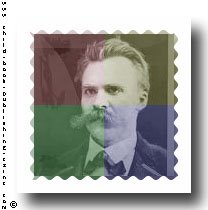 Friedrich Nietzsche was a German philosopher. He lived in the late 19th century and challenged the traditional morality and Christianity. He relied on the facts of life on our world not on that world beyond our senses. He inspired leaders in all cultural life like poets, novelists, painters, dancers, musicians, psychologists, philosophers, sociologists and social revolutionaries.
Friedrich Nietzsche was a German philosopher. He lived in the late 19th century and challenged the traditional morality and Christianity. He relied on the facts of life on our world not on that world beyond our senses. He inspired leaders in all cultural life like poets, novelists, painters, dancers, musicians, psychologists, philosophers, sociologists and social revolutionaries.Friedrich Wilhelm Nietzsche was born on October 15, 1844 in a rural farmland southwest of Leipzig in small German town called Rocken bei Lutzen (Rocken bei Lutzen). He was named after the Prussian King, Friedrich Wilhelm IV, because his birthday coincided with the 49th birthday of the king, who had been responsible to appoint Friedrich Nietzsche's father as Rochen's town minister.
Friedrich Nietzsche's grandfathers were Lutheran ministers, but his paternal grandfather, Friedrich August Ludwig Nietzsche, was distinguished as a Protestant scholar. While Friedrich Nietzsche was 4 years old, his father Karl Ludwig Nietzsche died (1813-1849) and his two years old brother, Joseph died six months after his father. The family left the town soon after that, to Naumburg a der Saale, where Friedrich Nietzsche lived for eight years with his mother, Franziska (1826-1897), his paternal grandmother, Erdmuthe, his father's two sisters, Auguste and Rosalie, and his younger sister, Therese Elisabeth Alexandra (1846-1935).
Friedrich Nietzsche attended boarding school Schulpforta near Naumburg at the age of 14 until 19 when he prepared for his university studies. Friedrich Nietzsche led during summers the Germania music and literature club and became acquainted with Richard Wagner's music. Friedrich Nietzsche met Paul Deussen during his studies and they became friends. Deussen became later an Orientalist, historian of philosophy, and the founder of the Schopenhauer Society in 1911.
While Friedrich Nietzsche was a teenager he read the German romantic writings of Friedrich Hölderlin and Jean-Paul Richter, plus David Strauss's "Life of Jesus Critically Examined 1848.
Friedrich Nietzsche graduated from Schulpforta and entered the University of Bonn in 1864 as a theology and philosophy student, but his interests drove him more towards philology.
As a philosopher and philologist Friedrich Nietzsche criticized religion, morality, contemporary culture and philosophy. His published critiques imposed fundamental questions regarding the life-affirming and life-denying qualities of different attitudes and beliefs.
Friedrich Nietzsche received recognition during the 20th century in German, French and some British intellectual institutions and regarded influential figure in modern philosophy.
Friedrich Nietzsche received an extraordinary offer to become professor of classical philology at the University of Basel before having him completed his doctorate. He published during 1873 and 1876 four long essays: David Strauss: the Confessor and the Writer, On the Use and Abuse of History for Life, Schopenhauer as Educator, and Richard Wagner in Bayreuth. Those four essays published as a collected edition later under the title of: Untimely Meditations.
Friedrich Nietzsche travelled frequently and lived until 1889 as an independent author in different cities in Europe. He lived from his pension from Basel and received aid from friends.He published "Daybreak: Reflection on Moral Prejudices" in 1881, the first part of "The Gay Science" in 1882, and "Beyond Good and Evil" in 1886.
Friedrich Nietzsche continued to have frequent attacks of illness. In 1887, Friedrich Nietzsche wrote the polemic "On Genealogy of Morals". He had mental collapse in January 3, 1889. His health deteriorated and he died in August 25, 1900.
From his works:
The Birth of Tragedy
Untimely Meditations
Human, All Too Human
Day break
The Gay Science
Thus Spoke Zarathustra
Beyond Good and Evil
On the Genealogy of Morals
The Case of Wagner
The Twilight of the Idols
The Antichrist
Ecce Homo
Nietzsche Contra Wagner




No comments:
Post a Comment